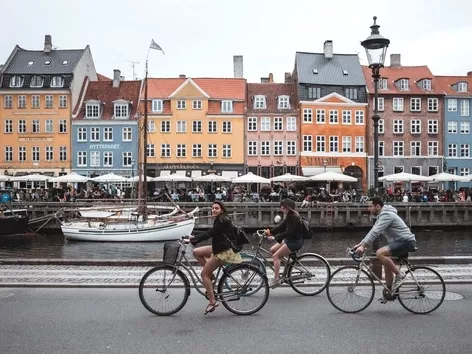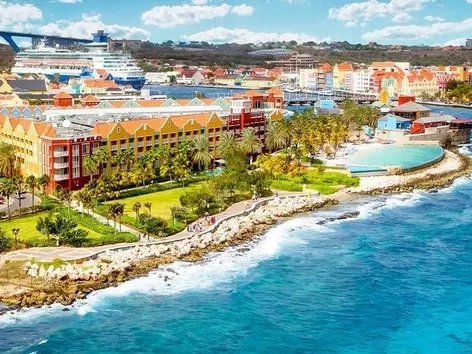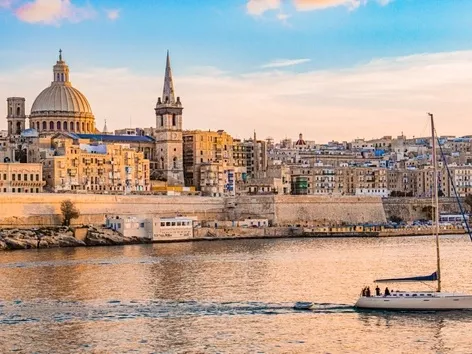Cost of living in Denmark: expenses for housing rent, food, entertainment and budget for the month

Denmark is included in the list of the happiest countries in the world, and a friendly population, developed transport infrastructure and a high level of health care attract more and more expats here. However, most people know that living in Denmark is expensive. As far as? Find out the prices of accommodation, food, entertainment and more in Denmark in 2024
Denmark is a European country that is well-known for its high standard of living, vibrant nature, bustling cities and a perfect work-life balance. In 2024, representatives of Uzbekistan, Nepal and the Philippines are the most likely to go to the country. However, the cost of living in Denmark is also quite high. In particular, two cities in the country - Copenhagen and Aarhus are among the top 15 most expensive cities in the world. Life outside them is certainly not so expensive, but it is not cheap either.
High salaries and a strong social sphere compensate for such a high cost of living in the country, however, before planning to move here, expats need to understand the extent of their monthly expenses.
Is it expensive to live in Denmark? We talk about the cost of living in Denmark in this article.
Currency in Denmark
The official currency of Denmark is the Danish krone, denoted as DKK. As of September 2024, the official rate is:
1000 USD = 6705 Danish kroner
£1,000 = 8,945 Danish kroner
1,000 euros = 7,458 Danish kroner
For a more convenient comparison, in this article, the prices of living in Denmark are indicated in euros.
Average monthly expenses in Denmark
The budget of a married couple who will settle in Copenhagen should be from €2,800 per month. In Aarhus or Odense, you should expect 2300-2500€ per month.
A family of four will need €3,927, excluding the cost of renting a house.
Prices for renting housing in Denmark
As in most European countries, housing rent will become a significant item of your expenses. However, before you start looking for an apartment, pay attention to the following feature, Denmark is a small country, it is much cheaper to live outside the big cities, and if you add to this the fact that the journey to Copenhagen does not take long, looking for housing in the countryside can be the best choice for expats.
- The cost of real estate in Copenhagen
Housing in Copenhagen is expensive and in short supply, given the city's size and popularity. A one-room apartment on the outskirts of the capital will cost from €1,300 per month, in the central part around €2,000.
- The cost of housing outside the Danish capital
In Aalborg or Odense, you can find housing for €1,000 per month.
- What is important to consider when renting an apartment in Copenhagen?
When renting an apartment, you should expect that an initial deposit must be paid when signing the contract. Its amount is the equivalent of three months' rent. Also, some landlords may ask to pay additional rent, three months in advance.
- Prices for utility services in Denmark
Utilities are usually not included in the rental price. Fees for water, heating and electricity are approximately €120-150 per month. Internet - 20€ per month.
Food price in Denmark
Meat, wine and cigarettes are the most expensive in the country. Potatoes and onions are about €1 per kilogram. Fruits - within 2€ per kilogram. A bottle of water – 2€, milk (1 l) – 4.5€, bread – 2€.
Depending on your expenses, a married couple will need between €400 and €500 per month to buy groceries.
- How to save on products in Denmark?
Products in Denmark are usually expensive. However, due to careful budget planning, costs can be minimized. To save on products, follow these tips:
1. Try to buy local seasonal products and avoid imports.
2. Visit budget supermarkets such as Bilka, Lidl, Netto, Fakta or Aldi.
3. Shop at the markets. There are food markets in Denmark where you can buy natural farm products. There are also markets for shoes, clothes, flea markets, various fairs and exhibitions.
Prices of entertainment in Denmark
Lunch in an inexpensive restaurant will cost you 20€, and dinner for two in a middle-class restaurant - 80€. An hour of training on the tennis court on a weekend costs from €25. A monthly subscription to a fitness club is €35. A ticket to the cinema is €15.
Cost of transport in Denmark
The Danish government calls Denmark "the country of cyclists". In fact, there are 4.5 million bicycles in Denmark, which is almost one for every person living there. Therefore, you can easily move around the city using this type of transport.
Denmark has an excellent and cheap public transport system. Buses, trains and public transport make it easy to get around and between cities.
A ticket for a single trip in public transport costs €3, and a monthly pass costs €55.
If you prefer to drive, most of the road network is free to use, although there are some tolls, and traffic in cities can be heavy during rush hour. Gasoline is expensive in Denmark, 1 liter of fuel costs €2.
Calling a taxi is 6€ and 3.5€ for each kilometer. Waiting for a driver for a passenger is very expensive - about €60.
Prices for medical services in Denmark
Denmark has a comprehensive healthcare system that includes both public and private services. If you work in Denmark, you will be entitled to public health insurance, which means free specialist doctors and hospital treatment.
However, you will need to pay for dental care and reimburse 25% to 50% of the cost of prescription drugs.
Without medical insurance, the cost of medical services is very expensive, a one-time consultation with a doctor from 250€.
You will need health insurance to safely move and find employment in a new country. You can issue an extended policy on our website using the link.
Prices for education in Denmark
Denmark has a high-quality education system that includes several excellent universities for higher education. The University of Copenhagen ranks 39th in the world ranking of universities.
Studying at a Danish university is free for EU students and those with a permanent residence permit, a temporary permit that can be changed to permanent, or non-EU students whose parents are already working in Denmark.
If you are not eligible for free university education, the fees will vary depending on the course and institution you choose. To give you an idea, the approximate cost of a full course is between €7,700 and €20,000.
The cost of living in Denmark is significantly higher than the European average, but the high level of wages and the strong social sphere of the country compensates for these costs.
We will remind you! Every year, tens of thousands of foreigners apply for a work permit in Denmark, because the country offers competitive wages, a variety of jobs and a high standard of living. We have already talked in detail about the features of the Danish labor market, the most popular vacancies and the average salary for foreigners in 2024.
Igor Usyk - Head of Migration department at VisitWorld
To ensure a safe move to a new country, I advise you to consult a specialist. My colleagues, qualified specialists with a legal education, will help you avoid unpleasant situations during migration.
Products from Visit World for a comfortable trip:
Checklist for obtaining a visa and necessary documents in Denmark;
Legal advice on immigration to Denmark;
Travel insurance for foreigners in Denmark;
Medical insurance all over the world.
We monitor the accuracy and relevance of our information. Therefore, if you see any error or discrepancy, please write to our hotline.
Recommended articles
3 min
Work
Bulgaria is a country in Eastern Europe that is a member of the European Union. In recent years, the state has become increasingly popular among expats looking for work abroad. Find out how to get a work visa in Bulgaria and what are the features of working here
03 cze. 2025
More details3 min
Expats
Birth Tourism: top countries that issuing child citizenship by birth
The concept of maternity tourism is becoming increasingly popular, although opinions on this practice vary widely. Women travel to another country to give birth in order to receive higher quality medical care and the benefits of dual citizenship for the child. Find out which countries are the best for maternity tourism and why
21 wrz. 2024
More details2 min
Travels
Life In Curaçao As An Expat: Detailed Guide for Foreigners
Curacao is an island in the Caribbean, which attracts expats with heavenly living conditions and economic prospects. Find out what are the advantages and disadvantages of moving here, what is the procedure for obtaining a residence permit and what is the list of benefits that an expat will receive after moving
22 wrz. 2024
More details3 min
Expats
Living in Malta as an expat: pros and cons, cost of living and employment prospects
Malta is a country in Europe that boasts a wonderful climate, rich architecture and a measured lifestyle. Also, this island state is a promising destination for employment and starting a business. Find out what the pros and cons of moving to Malta are, what the cost of living is and where most of the island's expats work
23 wrz. 2024
More detailsAll materials and articles are owned by VisitWorld.Today and are protected by international intellectual property regulations. When using materials, approval from VisitWorld.Today is required.
